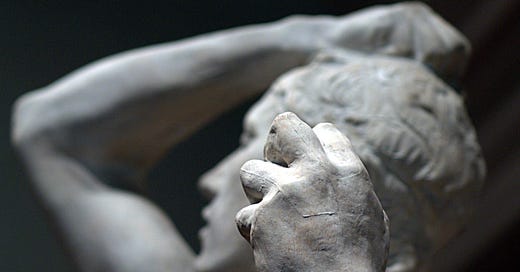My mum came to visit recently, and she always brings with her a huge pile of newspaper supplements she has saved for me. I no longer get a weekend newspaper regularly but I quite like this ritual - I go in the bath with the stack and catch up on the cultural zeitgeist of several months all in one go. This time, it was clear the “women having wild mid-life sex” meme was still going strong (strangely, the male version is nowhere to be seen), we are still being encouraged to treat our houses and wardrobes as in need of constant updating and anxiety around screens and parenting are running high. What stood out as newly central was a bare display of fear of death, lightly disguised as lifestyle articles. I read three pieces about so called “biohackers”, who are a strange breed who want to extend their life span at any cost. They seem to spend the first three (early) hours of every day on outlandish and expensive rituals, excercise all the time, eat very little and go to bed at 8pm. Some even sleep in a “Faraday Cage” to block out harmful WiFi from neighbours.
In amongst these adorably ridiculous, tightly wound people with too much money and too little purpose (and presumably, no social life) there was one which felt more honest. Stig Abell, Times journalist and former editor of the Times Literary Supplement (and The Sun, which is quite a swerve) wrote a startlingly vulnerable piece about his midlife obsession with diet and excercise:
To me, a meal has become something to get through, to complete, to finish for the day, the calories in it part of a transaction, a calculation: if I eat this amount and do this level of exercise, then some equation in my mind can be made to work. I don’t need you to tell me how joyless that is. In middle age, food had become an enemy, something to be battled, overcome.
It is a piece about a culture of “enforced narcissism“ and a wry, self deprecating look at the ways middle aged men trend towards obsession. A few lines though, reveal something deeper:
Is me huffing and puffing in a singlet in my garden any different from the Lycra-clad monomaniacs careening down the roads every weekend morning, with their puckered faces and sheeny buttocks? No, it isn’t. It is easy to sneer at overserious cyclists (I’ve just happily done it), but they are only doing their version of the same thing as many of the rest of us. Like the people too invested in climbing, wild swimming, triathlons or ultramarathons. Clinging to something tangible simply to avoid being unmoored by existence.
It ends with one of the most quietly sad lines I have read in a glossy magazine:
I may be wrong, but I wonder if we are all finding ways to struggle with the exhausting, overwhelming, competitive, unresting condition of modern existence. There will be some who cope with gay abandon, with underthinking, with hedonism. But there will be others clinging to routine, compulsive in what they put into their bodies or what they make their bodies do on a daily basis. The modest obsessives. Those of us who are having a crisis but doing it as quietly as we can. There may not be much hope for us, but it would be nice to think that we are not alone.
Humans have always had to reckon with what Hartmut Rosa calls “the uncontrollability of the world”. The reality of our precarity becomes more acute as we age, as our losses and unmet longings accumulate. Underneath it all, consciously or unconsciously, there is the fact of our own mortality. Terror Management Theory posits that much of our behaviour is driven by fear of death. The biohackers explicitly admit this.
There are (at least) four ways we can respond to the precariousness of being a person.
Keep reading with a 7-day free trial
Subscribe to Fully Alive by Elizabeth Oldfield to keep reading this post and get 7 days of free access to the full post archives.





